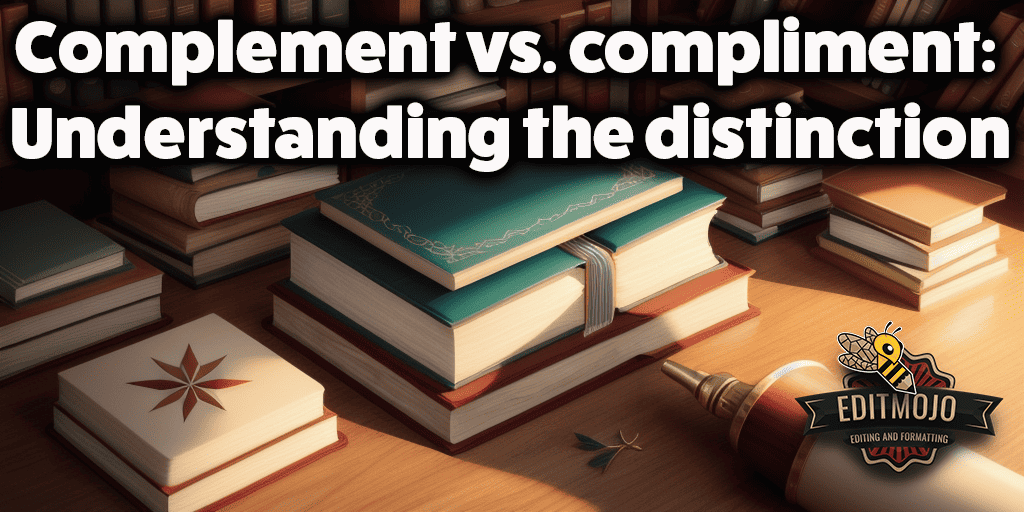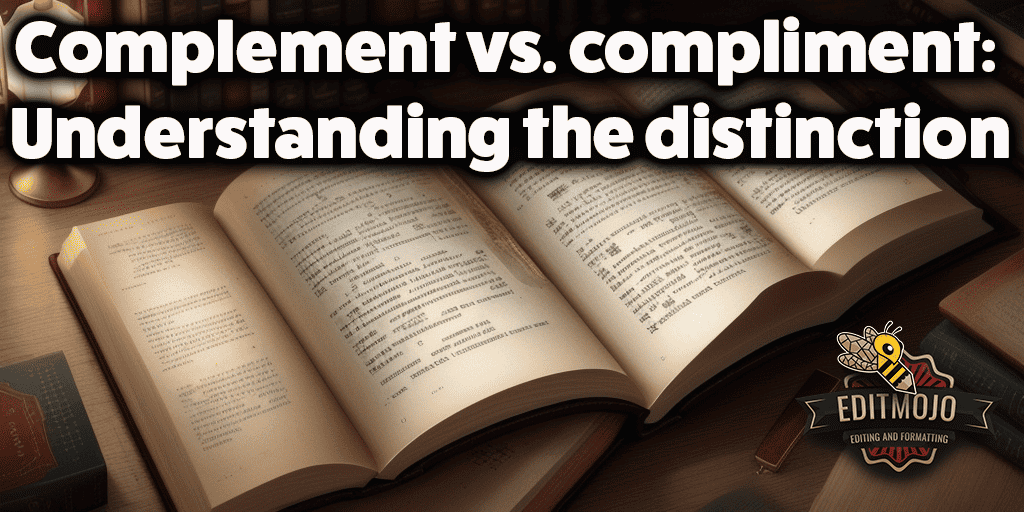Complement vs. compliment: Understanding the distinction. In the realm of the English language, few things are more perplexing than homophones. These are words that sound alike but have completely different meanings. An iconic pair of homophones that often trip people up is ‘Complement’ vs. ‘Compliment’. Their similar spellings and pronunciation are a linguistic trap, causing even the best of us to misuse them. Today, we’re embarking on an enlightening journey, to pull apart these look-alikes and uncover their unique identities.
Key takeaways:
| Word | Meaning | Example |
|---|---|---|
| Complement | Something that completes or enhances another thing | “Your new dress complements your eye color.” |
| Compliment | An expression of praise or admiration | “I complimented her on her insightful presentation.” |
| Common Mistake | Using one word when the other is intended | Saying “The sauce really compliments the steak” instead of “The sauce really complements the steak.” |
| Mnemonic | ‘E’ in complement for ‘Enhance’ and ‘I’ in compliment for ‘admiration’ | Remember: Complement – Enhance, Compliment – Admiration |
| Application | Practice using these words correctly in everyday conversations and writing | “Your skills complement our team’s capabilities.” “I want to compliment you on your hard work.” |
Complement: The Harmony-Bringer (grammar)
To put it simply, ‘Complement’ (with an ‘e’) means something that completes or goes well with something. It can be a noun, referring to a thing that completes or enhances another, or a verb, implying the action of completing or enhancing. Picture a fine wine that goes perfectly with a cheese platter; they complement each other.
Consider the sentence: “The handmade curtains complement the antique furniture in the room.” The curtains enhance the beauty of the furniture, making them a complement.
The term ‘complement’ also has a specific meaning in mathematics and grammar. In mathematics, it refers to the amount needed to complete something, like an angle or set. In grammar, it denotes a word or words that are needed to complete the meaning of an expression.

Compliment: The Appreciation-Expresser
On the other hand, ‘Compliment’ (with an ‘i’) is about expressing praise or admiration. It can be a nice remark about someone’s outfit, a recognition of someone’s hard work, or even an appreciative comment about a well-cooked meal.
For instance, the sentence: “He complimented her on her eloquent speech.” Here, ‘complimented’ signifies the act of expressing admiration for her speech.
A Handy Mnemonic
To remember the difference between ‘Complement vs. Compliment’, here’s a handy mnemonic: Think of the ‘e’ in complement as ‘enhance’ because a complement enhances something else. Similarly, consider the ‘i’ in compliment as ‘admiration’, as a compliment is a form of admiration.
Common Misconceptions and Mistakes
An all-too-common mistake is using ‘compliment’ when you mean ‘complement’, and vice versa. It’s understandable given their phonetic similarity, but such errors can lead to confusing or even awkward situations. Imagine telling a friend that their new shoes ‘compliment’ their outfit. Unless those shoes are particularly loquacious, you’ve just fallen into the homophone trap!

Complement vs. Compliment: Conclusion
English, with its abundance of homophones, can sometimes feel like a minefield. But with a bit of practice and patience, you can navigate it with ease. Remember, ‘complement’ and ‘compliment’ may sound the same, but they play very different roles in our language. Keep the handy mnemonic in mind, and you’ll never stumble over ‘Complement vs. Compliment’ again.
So, next time you want to appreciate someone’s
excellent sense of style or the way their artwork enhances the room, make sure you’re using the right word. Now, go forth, and conquer the world of homophones with your newfound knowledge!
The Art of Application
Now that we’ve mastered the distinction between ‘Complement vs. Compliment’, let’s take a look at how to apply this knowledge in real-life scenarios.
For example, when appreciating a colleague’s contribution to a project, you might say: “Your graphic designs truly complement the content of our presentation.” Here, you’re noting how the designs enhance or complete the presentation.
In another scenario, you might want to praise a friend’s performance in a play. You could say: “I want to compliment you on your outstanding performance tonight.” This time, you’re expressing admiration or praise.
Avoiding the Pitfalls
To avoid the pitfalls of misusing ‘Complement vs. Compliment’, consider doing a quick mental check each time you use them. Ask yourself, “Am I expressing praise, or am I talking about something that enhances or completes something else?” This little moment of self-check can save you from many a linguistic faux pas.
Practice Makes Perfect
The key to truly mastering ‘Complement vs. Compliment’ lies in practice. Start by consciously using these words in your everyday conversations and writing. Over time, you’ll find it increasingly easy to pick the right word without a second thought.

A Final Thought
In the end, the English language is a rich tapestry, woven with an array of words that sound alike, but have meanings as unique as the threads themselves. ‘Complement vs. Compliment’ is just one such pair of words. By understanding the difference and mastering their usage, you can enrich your communication skills and express your thoughts with increased clarity and precision.
Remember, every word has its place, and every place, its word. The art of language lies in matching the two flawlessly. So, here’s a compliment for you: Congratulations on expanding your linguistic prowess by understanding the distinction between complement and compliment!
Complement (meaning something that completes or goes well with something):
- The red wine was a perfect complement to the steak dinner.
- Her earrings are a nice complement to her outfit.
- I think your skills will complement the team very well.
- The new software complements our existing systems.
- This dessert is the perfect complement to our meal.
- Your creativity really complements your technical skills.
- The sofa and the rug complement each other nicely in the living room.
- The tangy sauce is a wonderful complement to the grilled fish.
- This new initiative complements our existing efforts to combat climate change.
- The serene background music complemented the peaceful atmosphere of the spa.
Compliment (meaning a polite expression of praise or admiration):
- She received a compliment about her presentation from the boss.
- I’d like to compliment you on your excellent cooking.
- He complimented her on her eloquent speech.
- The teacher complimented the student on his well-written essay.
- I received several compliments on my new haircut.
- She couldn’t help but compliment the design of his website.
- The compliments on my new dress made my day.
- He was quick to compliment his team on their hard work.
- She was flushed with pride when her professor complimented her thesis.
- Your boss might compliment your diligence if you consistently perform well.
